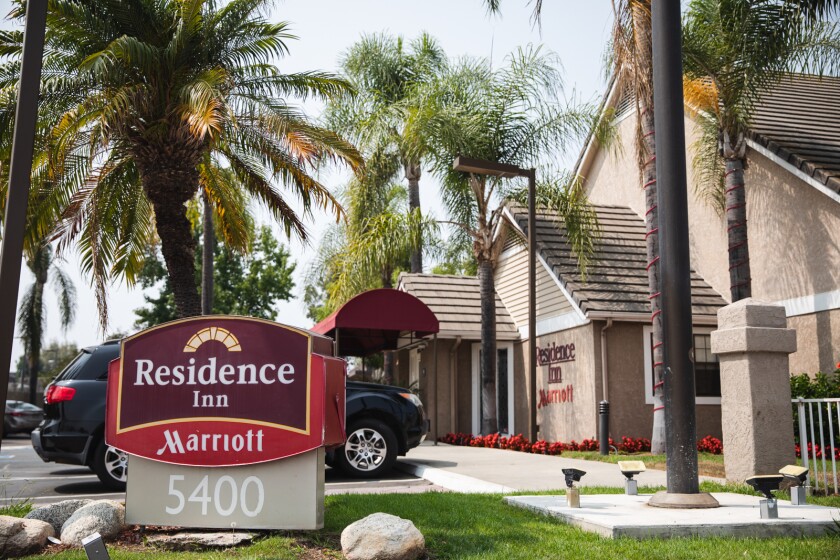A Marriott Residence Inn in Hotel Circle and another in Kearny Mesa may become permanent housing for up to 400 homeless people now living at a temporary shelter in the Convention Center under a plan going before the San Diego Housing Commission on Friday.
The purchase plan was announced late last month, and the names of the hotels were revealed Tuesday with the release of the meeting agenda.
Housing Commission President and CEO Rick Gentry said the key to the purchase came from $37.7 million from the state’s $600 million Project Homekey grant program to house homeless people during the pandemic. Specifically, $27.7 million will help pay for the Marriott at Hotel Circle and $10 million for the Kearny Mesa site.
The total cost of the 5.06-acre, 192-room Residence Inn at 1865 Hotel Circle South is $67 million and the cost of the 3.63-acre, 144-room Residence Inn at 5400 Kearny Mesa Road is $39.5 million.

The Residence Inn by Marriott located on Kearny Mesa road. The San Diego Housing Commission plans to purchase two Marriott hotels to convert them into permanent housing for homeless people.
(Kristian Carreon/For the San Diego Union-Tribune)
The breakdown comes to about $349,000 a unit for the Hotel Circle property and about $274,000 a unit for the Kearny Mesa site.
Gentry said the cost reflects the market in San Diego, and he pointed out that each unit will serve as an apartment and has a kitchenette. Each building also has other accommodations such as common areas, and the complexes will include supportive services for tenants.
He also noted that the Housing Commission considered 29 properties before selecting the two, with inspectors looking for buildings that were in good shape and would require little renovations, which can add to costs and delay openings.
Each building will have two rooms for managers and together will have 332 permanent supportive housing units, including 72 two-bedroom rooms. In all, they will provide rooms for more than 400 people. Supportive services on the properties will be funded with $5.4 million that was added to the county’s budget through a proposal by Supervisor Nathan Fletcher on Aug. 25.
The Housing Commission has committed 190 federal housing vouchers to the Hotel Circle site and 142 vouchers to the Kearny Mesa property.
Besides the Project Homekey grants, additional funding for the purchases will come from a variety of sources, Gentry said. The Hotel Circle property funding includes a $32.8 million loan from Chase Bank, $928,000 in federal Moving to Work funds, $10 million in federal Community Development Block Grant funds and $3.5 million in a deferred developer fee.
Funding for the Kearny Mesa property includes a $17.4 million loan from Chase Bank, $6.6 million in Moving to Work funds, $10 million from the city’s Coronavirus Aid, Relief, and Economic Security Act, and $2.5 million from a deferred developer fee.
In announcing the purchase plan last month, Gentry called the venture a game-changer in the city’s effort to create housing for homeless people. Rather than purchasing and refurbishing older buildings, buying newer hotels with rooms that can serve as homes will potentially bring units online faster and save costs.
The purchase also nudges the city closer to a goal set by the Community Action Plan on Homeless presented to the City Council last October. The plan identified a need for 2,659 additional permanent supportive housing units in the next 10 years, with 1,595 of those, or 60 percent, to be developed within the first four years.
The opening of the hotels also creates an exit plan for the temporary homeless shelter that opened at the San Diego Convention Center in April. The city had closed its large tented shelters out of fears that the coronavirus could spread inside and moved hundreds of people to the Convention Center shelter.
That shelter is expected to close by the end of the year, with many people moving from there and into the hotels. Others are expected to move back to the city’s bridge shelters, which will have fewer people as a safety measure against the spread of the coronavirus.
San Diego Mayor Kevin Faulconer praised the hotel purchases in a press release Tuesday.
“Rapidly converting hotels into housing is how we get new units available faster and at a lower cost for taxpayers as San Diego continues to lead the state with innovative homeless solutions,” he said. “There’s a reason why San Diego is the only region in the state to see homelessness decline each of the past two years. We now have another opportunity with these hotels to end the cycle of homelessness for hundreds more people.
The Kearny Mesa property was built in 1990 and was renovated in 2013, and the Hotel Circle property was built in 2003.